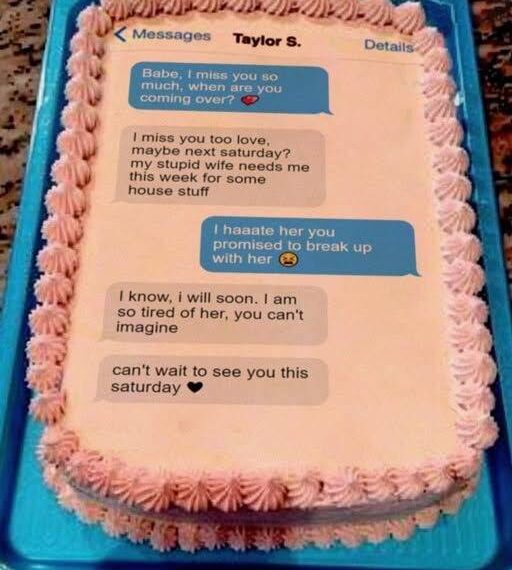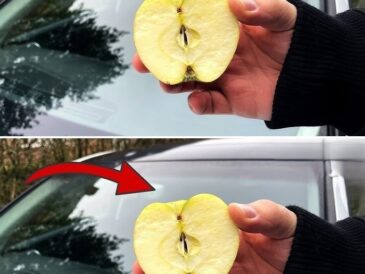The opportunity came sooner than expected. A mutual friend’s birthday dinner — the sort where couples and single friends mix, where everyone tries to look like their lives are exactly in order. Taylor insisted on going; he wanted to be social, to be seen. He was eager, bright, full of the kind of charm that dissolves guilt in public.
I went, too. I wore something he loved on me — because I wanted myself to be comfortable in my skin, not to make him jealous. We laughed, clinked glasses, and I pretended the bakery‑box heart did not hum under my skin like a live wire.
At the restaurant, when the cake arrived for the friend, I excused myself to the restroom. My phone buzzed with a message from the bakery: “Delivery confirmed today at 2:03 PM, left with neighbor. Total $32.00.” I texted that to myself so it would be timestamped and filed away, and then carried on.
After dinner, back at our house with the friends gone, I brought out the cake.
Not the one from the bakery. That one I had mailed, anonymously, back to the shop with a note: “Wrong address? Please keep.” I made sure their staff received it and that the credit note went through their system. That felt petty in the best possible way: no violence, no public shaming, just an administrative rebuke and the knowledge of who had actually paid.
The cake I brought to our kitchen counter was another thirty‑dollar cake I’d bought on purpose: same size, same generic frosting design, same cursive message. I placed it on the island and turned to him, arms folded calmly.
“You got something in the mail today,” I said.
He blinked. “Yeah? Oh. That bakery box?”
“Yeah.” I set the new cake between us like a tiny altar. “Do you want to tell me who sent you a cake that said, ‘I miss you already’?”
He went the defensive route. “It’s nothing. A friend. A dumb joke.” He smiled the smile of someone trying to redirect a conversation.
I didn’t yell. I didn’t storm. I opened the bakery box with slow, ceremonious fingers. The frosting glinted. The piping looked perfect. I slid the card off the top and set it beside the cake. On the back, in a handwriting he could never claim ignorance of, I had slipped a note earlier that read, “From someone who knows.” I didn’t need to say anything else. My calm was the loudest thing in the room.
He parsed my expression, the evidence, the quiet. The confession came out in a way it always does: clumsy, defensive, then oily. He tried to apologize, to explain how nothing “meant anything” and how it was all “stupid” and he “didn’t know why he did it.” I listened, because I wanted the full story, not a string of excuses.
By the time he finished, the cake — and the whole $30 exchange that catalyzed a cascade — had done its work. It forced a truth into the light with crumbs on the counter.
I thought revenge meant spectacle; it didn’t. Real revenge, if you’re going to call it that, was simply reinventing myself on the other side of betrayal. It was eating pancakes on Sunday mornings alone, booking a pottery class I’d always joked I’d try “someday,” and reclaiming half the closet he’d always claimed as “his.” It was calling my friends and letting their outrage be my backbone until my own spine felt strong enough again.
I did have one last tidy flourish, because habits die hard and I like small, perfect endings. I kept the receipt from the cake I’d bought myself and framed it. Not to gloat — it was a simple, stupid memento of the moment I chose clarity over chaos. A $30 receipt in a cheap frame that hangs in my hallway as a reminder: I am the one who decides what I accept in my life.
People often ask: was I petty? Maybe. Was I cruel? Not in the way that leaves guilt gnawing at your bones. The revenge I wanted was clean: it returned agency, preserved dignity, and avoided ugliness. It cost thirty dollars and a little restraint. It also cost me a marriage, but not in the way tabloids want to sell that sentence. The marriage had been unraveling in small stitches long before the bakery box showed up. The cake didn’t destroy it — it exposed what was already fraying.
Today, I live on my own two feet, and occasionally, when I walk past that little framed receipt, I laugh. Not the bitter laugh of someone still poisoning themselves with revenge fantasies — but a clear, bright laugh that says, I survived my own bad chapter, and I rewrote the ending.
If there is a moral here, it isn’t “buy someone a cake and watch the fireworks.” It’s this: when you sense something’s off, trust the feeling enough to look, and then use your instincts to protect your life. Revenge is a story we tell ourselves to feel powerful when we’re vulnerable. The real power is the choices you make after you discover the truth. Choose dignity. Choose yourself.
And if you ever get a $30 cake with a heart piped on top? Eat it. Or don’t. Either way — make sure the rest of the story is yours.





